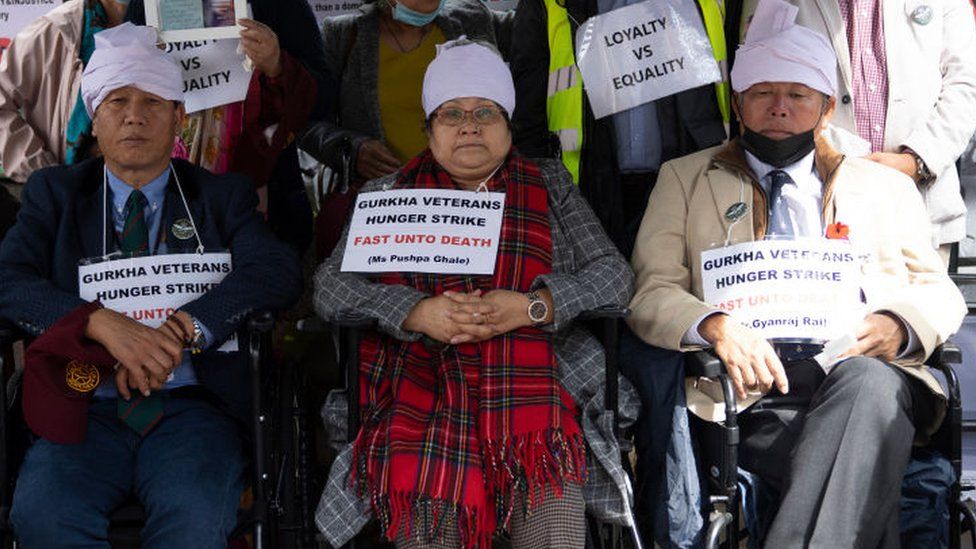
Dhan Gurung, Pushpa Rana Ghale and Gyanraj Rai are on hunger strike outside Downing Street
On Saturday morning, Gyanraj Rai ate his breakfast, headed to Downing Street, and began a protest about his pension. He hasn’t eaten since.
“Better to die than be a coward” is a motto of the Nepalese Gurkha soldiers, who have been an integral part of the British Army for more than 200 years.
And 63-year-old Mr Rai says he is prepared to die – to starve to death – if the government does not agree to make his pension equal to the British soldiers he fought alongside for 20 years.
Next to him in wheelchairs near the Downing Street gates are ex-soldier Dhan Gurung, 59, and Gurkha widow Pushpa Rana Ghale, 59, who has travelled from Nepal.
On Wednesday they entered their fifth day on hunger strike. They don’t even have a gazebo to shelter them from the elements. It was taken down by the Met Police, who said it was “in breach of local bylaws.”
“This is the last resort to go to hunger strike to the death,” Mr Rai tells the BBC. “We want to be treated equally with the British in every aspect. That’s why we are here, prepared to die.”
Rai says his pension is £350 a month compared with £1,200 for an ex-British soldier
More than 200,000 Gurkhas fought in the two world wars, and in the past 50 years they have served in Hong Kong, Malaysia, Borneo, Cyprus, the Falklands, Kosovo, Iraq and Afghanistan.
Yet Gurkhas who retired before 1997 receive a fraction of the pension the rest of the British Army receive.
The Gurkha Pension Scheme (GPS) was based on Indian Army rates for those with at least 15 years’ service.
The government says it was designed for retirement in Nepal, where the cost of living is significantly lower than in the UK.
But in 2009, all retired Gurkhas won the right to live in the UK, following a high-profile campaign led by actress Joanna Lumley, whose father served with the 6th Gurkha Rifles.
Gyanraj Rai, left and Dhan Gurung second from right, with actress and Gurkha campaigner Joanna Lumley
Rai, left and Dhan Gurung second from right, with actress and Gurkha campaigner Joanna Lumley
Mr Rai, who had travelled from Reading for the protest, says he followed his uncles to join the British Army aged 17.
“During service we were given a very small amount of salary compared to our British counterparts,” he says.
“And after our service, the pension was very low. My pension was only £47 a month, where a British veteran used to get over £800 a month.”
He says his lump sum on leaving the army was £3,000 compared to that of a British veteran who received between £60,000 and £70,000.
He says today he receives a monthly pension of £350 compared to British ex-soldiers of the same rank who receive £1,200 to £1,300.
When the BBC put these figures to the Ministry of Defence it did not dispute them.
This is not the first time Mr Rai has gone on hunger strike. He did not eat for 14 nights and 15 days in 2007.
He only stopped when pension rules were changed to give serving Gurkha soldiers equal pension rights with other service personnel in the UK.
But the British Gurkha Welfare Society said about 25,000 men who had retired before 1 July 1997 were denied the opportunity to transfer into UK armed forces pension schemes
– By Jennifer Meierhans BBC News